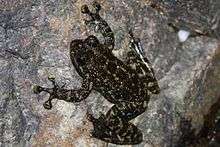Hong Kong cascade frog
| Hong Kong cascade frog | |
|---|---|
 | |
| Scientific classification | |
| Kingdom: | Animalia |
| Phylum: | Chordata |
| Class: | Amphibia |
| Order: | Anura |
| Family: | Ranidae |
| Genus: | Amolops |
| Species: | A. hongkongensis |
| Binomial name | |
| Amolops hongkongensis (Pope and Romer, 1951) | |
| Synonyms | |
|
Staurois hongkongensis Pope and Romer, 1951 | |
Hong Kong cascade frog or Hong Kong torrent frog (Amolops hongkongensis) is a species of true frog from southern coastal China,[2] once thought to be endemic to Hong Kong. Their eggs are laid on rock faces in the splash zones of cascades.[3] In Hong Kong, it is a protected species under Wild Animals Protection Ordinance Cap 170.
Distribution and habitat
Originally described from the Tai Mo Shan mountain in Hong Kong, populations are now also known from Guangdong in the mainland China.[1][2] In Hong Kong, the species is found in the New Territories and on Hong Kong Island.[3] It was found in rather small streams in Lung Fu Shan.[4]
Amolops hongkongensis inhabit forest-fringed, small hill streams, particularly those with cascades. Tadpoles have a ventral sucker helping them to maintain their position in the stream. Its habitat is threatened by silviculture, clear-cutting, and dam and other infrastructure construction.[1]
Description
Both male and female Amolops hongkongensis grow to a snout–vent length of 40 mm (1.6 in). Tadpoles are up to 25 mm (0.98 in) in length.[5] The diameter of its suction discs is 3-4 times the width of the fingers. It contains the tarsal fold and has white velvety nuptial pads on the first fingers.[3]
References
- 1 2 3 Michael Wai Neng Lau; Bosco Chan (2008). "Amolops hongkongensis". IUCN Red List of Threatened Species. Version 2012.2. International Union for Conservation of Nature. Retrieved 7 January 2013.
- 1 2 Frost, Darrel R. (2014). "Amolops hongkongensis (Pope and Romer, 1951)". Amphibian Species of the World: an Online Reference. Version 6.0. American Museum of Natural History. Retrieved 6 April 2014.
- 1 2 3 Lau, Michael (2005). "The South China Cascade Frog, Amolops ricketti, found in Hong Kong". Porcupine!. Department of Ecology and Biodiversity, HKU. 32 (March 2005): 8. Retrieved 7 January 2013.
- ↑ Sung, Yik Hei (2006). "Night safaris in Lung Fu Shan Country Park, Hong Kong". Porcupine!. Department of Ecology and Biodiversity, HKU. 34 (September 2006): 16–17. Retrieved 7 January 2013.
- ↑ Fei, L. (1999). Atlas of Amphibians of China (in Chinese). Zhengzhou: Henan Press of Science and Technology. p. 242. ISBN 7-5349-1835-9.
| Wikimedia Commons has media related to Amolops hongkongensis. |
